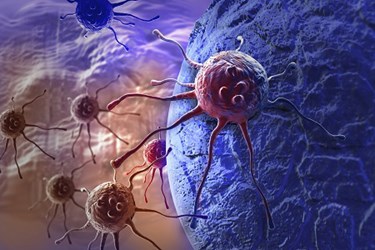Researchers Discover How Novel Drug Kills Cancer Cells
By C. Rajan, contributing writer

A collaborative effort between researchers at UC Davis, City of Hope, Taipei Medical University, and National Health Research Institutes in Taiwan, resulted in the discovery of the mechanism of action of a novel cancer drug. The study has just been published in the journal Proceedings of the National Academy of Sciences.
The research team found that the new drug is able to kill cancer cells by depriving them of an essential amino acid called arginine. Arginine plays a major role in cell division, immune function, and hormone regulation.
Typically, cancer cells are killed by a process called apoptosis, which is a cell-death process in which the DNA is damaged within the cell nucleus. In this study, the researchers found that arginine deprivation kills tumor cells through a novel mechanism involving mitochondria dysfunction, reactive oxygen species generation, nuclear DNA leakage, and chromatin autophagy.
"It has long been recognized that some cancer cells are resistant to apoptosis," said Richard Bold, professor and chief of surgical oncology at the UC Davis Comprehensive Cancer and a co-author of the study. "Now, we have another way to induce cells to undergo death that overcomes resistance to traditional apoptosis associated with cancer."
Dr. Hsing-Jien Kung, a UC Davis professor emeritus who now leads the National Health Research Institutes in Taipei, Taiwan, is another lead author of the study who first discovered the mechanism by which arginine deprivation works in 2009.
"Traditional cancer therapies involve 'poisoning' by toxic chemicals or 'burning' by radiation cancer cells to death, which often have side effects," Kung said. "An emerging strategy is to 'starve' cancer cells to death, taking advantage of the different metabolic requirements of normal and cancer cells. This approach is generally milder, but as this study illustrates, it also utilizes a different death mechanism, which may complement the killing effects of the conventional therapy."
The novel drug examined in the study is ADI-PEG20, which is developed by Polaris Pharmaceuticals of San Diego. ADI-PEG20 is an enzyme that specifically degrades arginine and breaks it down. This drug is currently in phase 3 clinical trials in liver cancer, phase 2 trials in melanoma, and phase 1 trials in prostate cancer.
"This opens up a new field," said Bold of the discovery. "Now we search for other agents that use this method and translate those into clinical trials." According to the researchers, using an arginine-deprivation induced cell death process for treating cancer would also spare patients the toxicity associated with chemotherapy.
